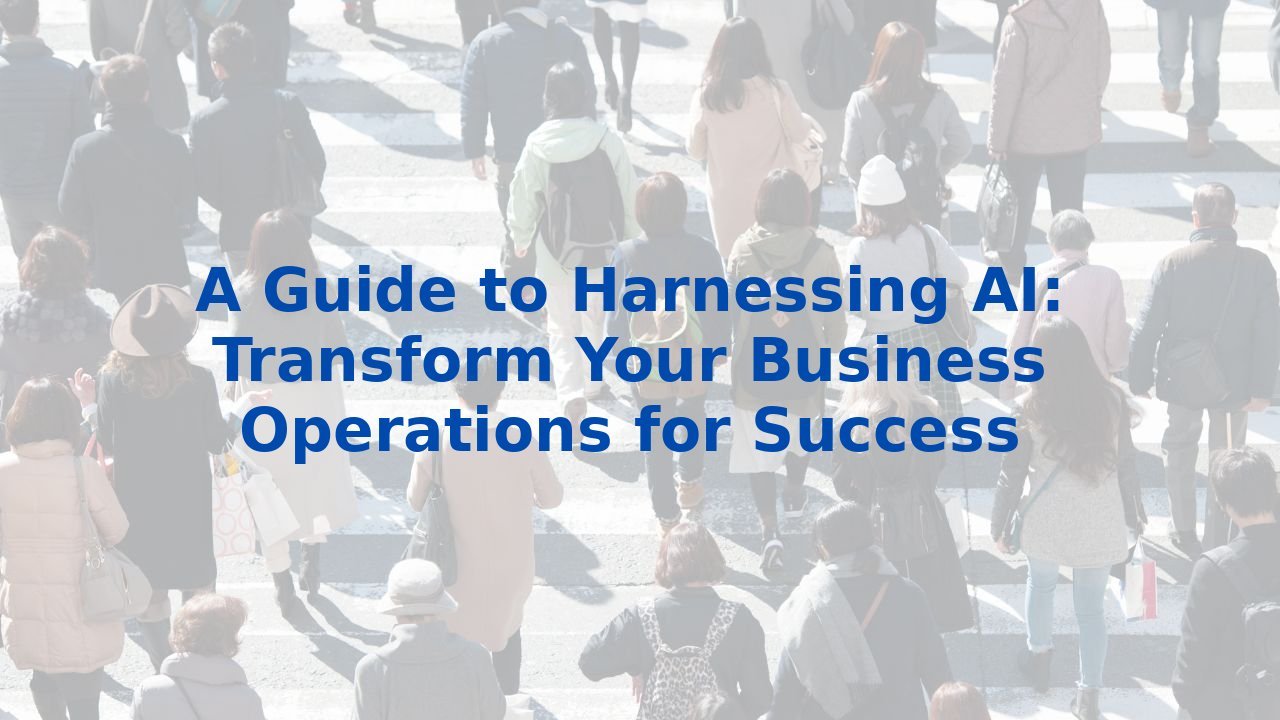A Guide to Harnessing AI: Transform Your Business Operations for Success
A Guide to Harnessing AI: Transform Your Business Operations for Success
In today's fast-paced business landscape, Artificial Intelligence (AI) has evolved from a novelty to a necessity. The true potential of AI lies in its ability to redefine how businesses operate at a fundamental level, enhancing efficiency, fostering innovation, and driving sustained growth. This guide will explore practical applications of AI and how its integration into various business processes can transform your organization.
Redefining Business Processes with AI
AI stands as a strategic catalyst, revolutionizing traditional business models. Integrating advanced technology into core operations not only enhances productivity but also equips organizations with the tools necessary to thrive in a digital-first world. By embracing AI, businesses can refine their processes, improve decision-making, and gain a competitive edge.
Automation and Operational Efficiency
One of the most immediate advantages of AI is its capacity to automate mundane, repetitive tasks. Through automation, businesses can significantly reduce both time and resources traditionally required for operations. Tasks that once took hours can now be executed in seconds, freeing employees to focus on more strategic endeavors.
This shift not only improves precision but mitigates human error, resulting in heightened productivity. As organizations automate operational processes, they not only streamline their workflows but also foster an environment where innovation can thrive. Learn more about how tailored training can elevate your team's efficiency with AI.
Advanced Data Analytics for Strategic Decision-Making
Data is the lifeblood of modern business, and AI provides new pathways for organizations to extract valuable insights from vast datasets. AI-enabled analytics tools harness machine learning and natural language processing to sift through information, uncovering trends and forecasting outcomes with unprecedented speed and accuracy.
By leveraging these insights, businesses can optimize strategies, adapt to shifting market dynamics, and proactively seize emerging opportunities. In essence, advanced data analytics empowers organizations to transition from reactive to proactive decision-making, positioning them strategically in competitive marketplaces.
Enhancing Customer Experience with Personalization
In an age where consumer expectations are at an all-time high, AI empowers organizations to elevate customer interactions through personalized experiences. Intelligent systems, such as chatbots and virtual assistants, engage customers in real-time, addressing queries and adapting recommendations to individual preferences. This level of personalization deepens customer relationships, fostering loyalty and engagement.
As businesses create tailored customer experiences, they realize a dual benefit: increased satisfaction and improved retention. With AI, organizations can anticipate customer needs, resulting in a service experience that feels not only relevant but truly invaluable.
Strengthening Security and Risk Management
In an era marked by escalating cyber threats, AI is a formidable ally in safeguarding business operations. By analyzing patterns and identifying anomalies in real-time, AI systems can detect and respond to security threats proactively. This capability enhances risk management frameworks, ensuring organizations can protect sensitive data and maintain customer trust.
Innovation and Product Development
AI is not just about enhancing existing processes; it is also a powerful enabler of innovation. By refining product development methodologies, AI optimizes design and production cycles, allowing businesses to respond with agility to market demands. This foresight not only yields faster time-to-market for new offerings but also positions organizations ahead of their competitors.
Getting Started with AI: Essential Steps
Venturing into the world of AI may seem daunting, but with thoughtful planning, any business can harness its power. Here are essential steps to consider:
1. Identify Areas for Automation: Assess your operations to pinpoint tasks ripe for automation.
2. Choose Scalable Solutions: Opt for user-friendly AI tools that can grow alongside your business.
3. Train Your Employees: Equipping staff with AI knowledge is critical to maximizing the potential of these technologies.
4. Monitor and Optimize: Continuously evaluate AI's impact on operations and refine processes as needed.
The Importance of Employee Training for Effective AI Integration
Employee training is a foundational element in unlocking AI's full potential. By developing a workforce adept in AI tools, organizations ensure seamless integration into existing operations. This training elevates employee skills and fosters a culture of innovation where insights can be leveraged for continuous improvement.
Conclusion
Integrating AI into business operations marks a pivotal step toward achieving operational excellence and innovation. By automating routine tasks, leveraging data analytics, personalizing customer interactions, and enhancing security, organizations position themselves for success in an increasingly competitive environment. Embrace the potential of AI, invest in employee training, and watch your organization thrive in the digital age.



